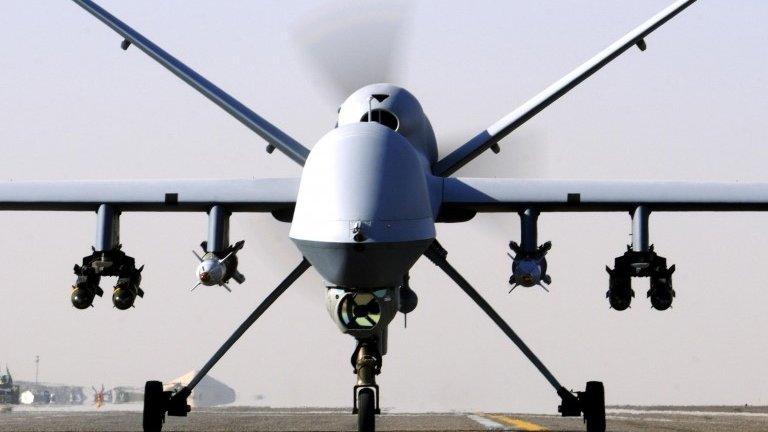Defence review: Spend more on SAS and drones - Cameron
- Published
David Cameron said a ''dangerous, insecure and difficult world'' meant an increase in defence spending was essential
More money should be spent on the SAS and drones to combat the threat of Islamic State extremists, David Cameron has told defence chiefs.
The prime minister has asked them to look at increasing funding for special forces and new spy aircraft as part of a review of the nation's defences.
Mr Cameron said it was about ensuring Britain's safety in an unstable world.
The priorities were set out after a pledge in the Budget to spend 2% of national wealth on defence until 2020.
The prime minister wants the strategic defence and security review, due to conclude by the end of the year, to prioritise resources that will help to protect the UK from evolving threats - not only extremism but also a more aggressive Russia and the risks posed by cyber attacks.
The defence chiefs were briefed in a meeting following the unexpected Budget commitment to meet Nato's target of spending 2% of national income on defence every year up to 2020.

What are drones?
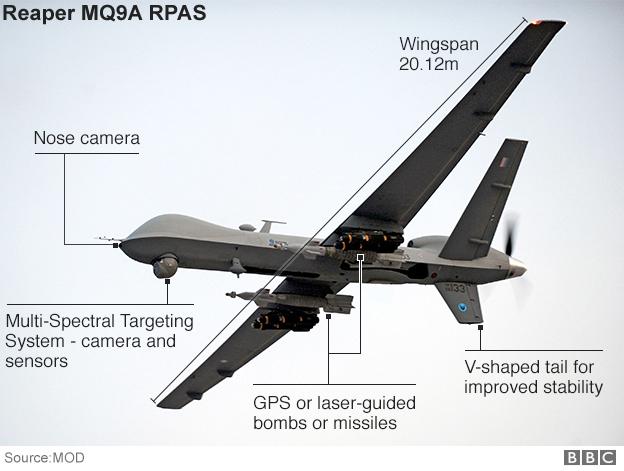
Drones are unmanned aircraft, often used in military situations where manned flight is considered too difficult or risky
They range from small intelligence-gathering craft, with radar and cameras, to large armed drones which carry missiles and laser-guided bombs
Trained crew can operate them from bases thousands of miles away
They can stay aloft for up to 17 hours at a time
The UK's drone base is in Waddington, Lincolnshire

Speaking during a visit to RAF Coningsby in Lincolnshire, Mr Cameron said: "It's about making sure we are safe in a very dangerous and unstable world.
"Because we've got a strong economy we can now make the commitment to spending more - over and above inflation - on defence, as much potentially as £6bn more between now and 2020, and that will make sure Britain is safer."
Mr Cameron told RAF crews the defence review would look at all the threats the UK faces but he singled out Islamic extremism as "the threat of our generation".
"And I'm absolutely determined that the RAF, Army and Navy will have the equipment, the means and the resources to deal with it.
"One of the things that we need is making sure that we have the drones, spy planes and special forces - the unique capabilities that make sure we can deal with this threat at its source."
The prime minister also visited RAF Waddington, the UK's drone base in Lincolnshire, from where operators fly unmanned aircraft over Iraq and Syria.

Analysis
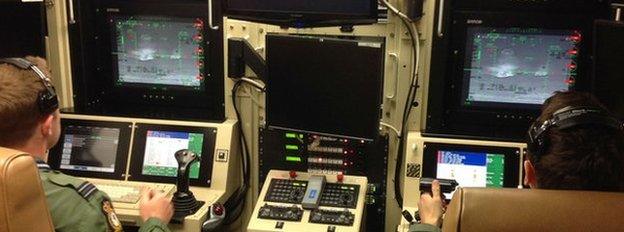
By BBC defence correspondent Jonathan Beale
The prime minister's emphasis on special forces and drones may at first sound sensible.
Both UK special forces and the RAF's Reaper crews already work closely with the US, and are highly valued by Britain's closest ally. However, neither grows on trees.
Special forces are selected from the ranks of the Army and the Royal Marines.
The talent pool has been getting smaller because of cuts to the size of the armed forces - overseen by David Cameron himself.
Those who have served in units like the SAS fear that to increase their number from smaller resources will lead to a lowering of standards.
Drones may also be the future. But the US is now finding, to its cost, that it's hard to attract and retain drone pilots.
The fact is most would still prefer to fly a fast jet.

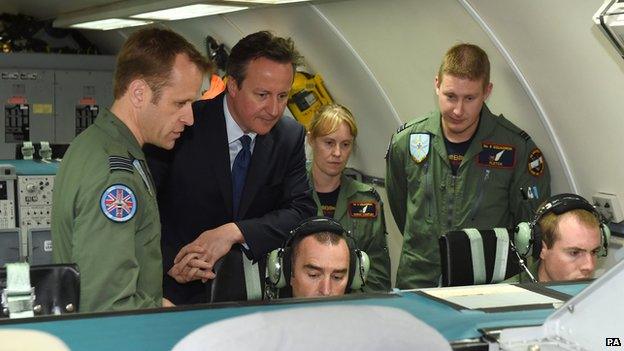
The prime minister was given a tour of an E-3D Sentry aircraft during his visit to RAF Coningsby
Maj Gen Jonathan Shaw, former director of Special Forces, told BBC Radio 4's World at One that the number of individuals at the "sharp end" could not be immediately increased because the selection process was so rigorous.
"You would not want to devalue the currency," he said.
"What you can do is increase the capability of the supporting assets. The individual man on the ground is only as powerful as what's supporting him - you need intelligence, drones, air assets, land transport, sea assets."
But Gen Shaw, who is also a former head of counter-terrorism at the Ministry of Defence, also warned of making the military more prominent in the fight against IS.
"If I was the commander of the force sent to defeat Isil (IS), I'd say 'What is my political end state that I'm aiming to enable?' Is it a unitary Iraq? Is it a unitary Syria?" he said.
"Because until you've worked out those questions you don't know who's on your team. "
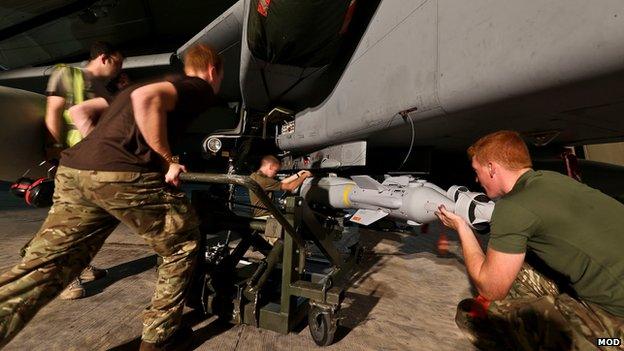
RAF jets have been involved in air strikes against Islamic State targets in Iraq
The RAF's Reaper drones and Tornado jets have been used to carry out air strikes against militants in Iraq and have also been providing air support for the Iraqi army and Kurdish Peshmerga forces in the fight against IS.
In Syria, the UK's drones are limited to a surveillance role - although ministers have begun setting out the case to extend the bombing campaign to the terror group's strongholds in that country.
'Parliamentary authority'
Meanwhile, Defence Secretary Michael Fallon told BBC Radio 4's Today programme the government's recent announcement that intelligence spending is to be included in the defence budget was not a tactic to ensure the UK met Nato's target that every country should ringfence 2% of its GDP for defence.
His comments come after Labour's shadow defence minister, Kevan Jones, suggested the government had "crossed the line" by allowing intelligence spending to contribute towards the 2% target.
Defence Secretary Michael Fallon MP: "The Defence budget will go up...but that does not absolve us from the need to be more and more efficient"
Mr Fallon said: "That is not going to affect the 2%. We meet the 2% anyway and we meet it easily."
On the possibility of extending bombing into Syria, he said it was a decision which needed "parliamentary authority".
Mr Cameron has invited acting Labour leader Harriet Harman to a high-level security meeting on Tuesday about the threat posed by IS.
The government is seeking support from Labour MPs to extend the RAF's air campaign to strikes against IS targets in Syria, as well as Iraq.
- Published8 June 2015
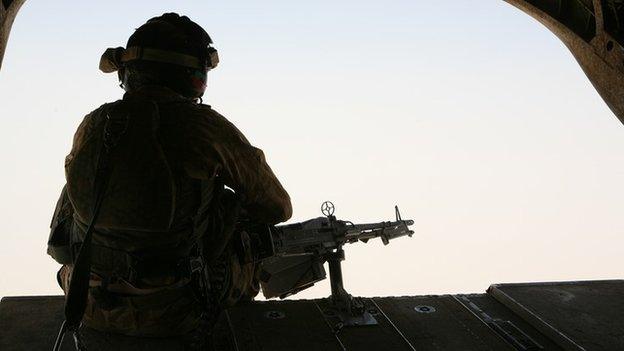
- Published8 July 2015
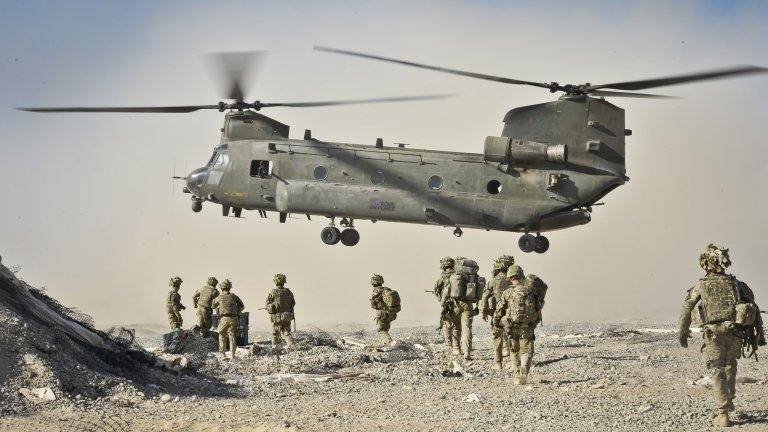
- Published9 July 2015
